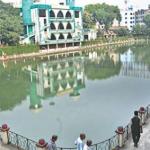Bangladesh's literary landscape boasts a wealth of classic novels that have left an indelible mark on its cultural history. One such masterpiece is "Amar Bondhu Rashed," written by the eminent Bangladeshi author, Professor Muhammad Zafar Iqbal. This novel, published in 1994, has resonated with generations of readers, young and old, offering a compelling narrative set against the backdrop of the Bangladesh Liberation War of 1971. In this 1200-word article, we will explore the significance of "Amar Bondhu Rashed," delving into its themes, characters, and enduring legacy.

Table of contents [Show]
The Historical Context of "Amar Bondhu Rashed"
Before delving into the heart of "Amar Bondhu Rashed," it's essential to understand the historical context that serves as the novel's backdrop. The Bangladesh Liberation War of 1971 was a pivotal moment in the nation's history. It was a struggle for independence from Pakistan, driven by political, social, and economic disparities between East and West Pakistan.
In this turbulent period, when the people of East Pakistan were yearning for their own identity and freedom, the novel's protagonist, Topu, provides readers with a lens through which to view these events. He befriends a new student, Rashed, who becomes a symbol of courage and patriotism for the young Topu and his friends.
The Characters
At the heart of "Amar Bondhu Rashed" are its compelling characters, each contributing to the novel's rich tapestry.
- Topu: The story's narrator and central character, Topu, is a young boy who witnesses and is profoundly affected by the events of the Liberation War. Through Topu's eyes, readers gain insight into the inner workings of a young mind grappling with complex political and social changes.
- Rashed: Rashed, the eponymous character, is Topu's new friend and a source of inspiration. He embodies the spirit of patriotism and unwavering dedication to the cause of Bangladeshi independence. His courage leaves an indelible mark on Topu and the reader, highlighting the power of individuals to influence others.
- Rashed's Father: Rashed's father, a freedom fighter, represents the broader adult world's commitment to the independence movement. His character exemplifies the sacrifices made by countless Bangladeshis who fought for their nation's freedom.
- Topu's Friends: Topu's circle of friends reflects the diversity of experiences among the youth during this turbulent time. Together, they provide readers with a broader perspective on the impact of war on the lives of ordinary people.
- The Teachers: The teachers at the school play significant roles in shaping the students' understanding of the political situation. Their distinct personalities and perspectives serve to add depth to the narrative.

Themes of "Amar Bondhu Rashed"
Friendship: At its core, "Amar Bondhu Rashed" is a story of friendship. Topu's bond with Rashed, and the camaraderie shared among their group of friends, is central to the narrative. This theme highlights the resilience of human relationships during times of crisis.
Patriotism: Patriotism is a prevailing theme throughout the novel. Rashed's unwavering commitment to the Bangladeshi independence movement and his willingness to make the ultimate sacrifice for his country serve as an inspiration to Topu and his friends. The novel underscores the power of patriotism in motivating individuals to take a stand.
Innocence and Loss: The story explores the loss of innocence that occurs during a time of conflict. The young characters, who should be engrossed in the ordinary concerns of childhood, are thrust into a harsh reality where they must confront the stark truths of war and sacrifice.
Resistance and Resilience: "Amar Bondhu Rashed" portrays the resilience of the Bangladeshi people in the face of adversity. It underscores their determination to resist oppression and fight for their rights and independence.
Impact of War on Children: The novel provides a poignant portrayal of how the war affects the lives of children. Through Topu and his friends, readers witness the profound impact of political turmoil on the younger generation, highlighting the need to protect and nurture their innocence.
Narrative Structure and Style
"Amar Bondhu Rashed" is narrated in the first person by Topu, which allows readers to empathize with his thoughts and emotions as he navigates the tumultuous events of 1971. The use of first-person narration creates an intimate connection between the reader and the protagonist, making the emotional impact of the story all the more potent.
The novel's language is simple yet evocative, making it accessible to a wide range of readers. Muhammad Zafar Iqbal's writing is characterized by its vivid descriptions, which bring the historical setting and the characters to life. The author skillfully combines vivid imagery with the raw emotions of the characters, enabling readers to immerse themselves fully in the story.

Impact and Legacy
"Amar Bondhu Rashed" has left an enduring legacy in the literary and cultural landscape of Bangladesh. Its timeless themes of friendship, patriotism, and resilience resonate with readers of all ages, making it a widely read and cherished work of Bengali literature. The novel is frequently taught in schools across Bangladesh, ensuring that each new generation of students is exposed to its poignant narrative.
In addition to its literary influence, "Amar Bondhu Rashed" has been adapted into a film, further expanding its reach and impact. The movie, like the novel, received critical acclaim and played a significant role in popularizing the story.
Moreover, the novel continues to serve as a source of inspiration for writers, artists, and scholars who explore the themes of the Bangladesh Liberation War and the impact of historical events on the lives of individuals. It has also prompted discussions on the resilience and courage displayed by the Bangladeshi people during a period of immense turmoil.
Conclusion
"Amar Bondhu Rashed" by Muhammad Zafar Iqbal is a literary gem that transcends time and borders. Through its engaging narrative, relatable characters, and evocative themes, the novel offers readers a powerful and emotional journey through one of the most significant periods in Bangladeshi history. The novel's exploration of friendship, patriotism, and the impact of war on children has made it a beloved and enduring classic in Bengali literature. "Amar Bondhu Rashed" is not just a story; it is a testament to the strength of human connections and the resilience of the human spirit in the face of adversity. Its legacy continues to shine brightly, inspiring generations to come and reminding us of the power of literature to capture the essence of a historical moment.











